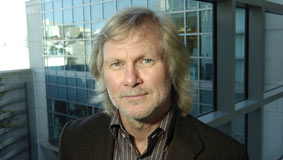One of the reasons that pancreatic cancer has been so notoriously difficult to treat is that it depends on a hyperactive cellular signaling pathway controlled by the protein K-Ras.

In fact, K-Ras is thought to be mutated in up to 90 percent of pancreatic tumors. When mutated, K-Ras plays a critical role in uncontrolled growth, survival, movement, and other cellular properties characteristic of cancer cells. Alarmingly, other tumor subtypes that display K-Ras mutations are frequently the most aggressive and resistant to treatment.
I have been studying the Ras signaling pathway for the past 25 years. Up until recently, however, my laboratory has not focused specifically on pancreatic cancer. The 2010 Fredman Family Foundation – Pancreatic Cancer Action Network – AACR Innovative Grant has allowed me to allocate resources and personnel to study a novel method to block K-Ras signaling, as a potential treatment for pancreatic cancer. Ras has been a thorn in the side of the drug discovery world for the past 20 years. I consider my strategy a new attack on an old target, and am optimistic that our approaches will lead to progress in the fight against pancreatic cancer.
I feel like now is a good time to get into the field of pancreatic cancer research. We have a tremendously deep understanding of the pathways and mutations that cause pancreatic cancer, and have some very good model systems that can reproduce human disease. I am proud to mentor some remarkable young scientists in my laboratory, whose focus is now devoted to pancreatic cancer. My wish is that this training will inspire them to dedicate their careers to studying this important and challenging disease.
The Pancreatic Cancer Action Network is greatly respected and appreciated by the entire research community. I am deeply grateful for this award granted in memory of Ruth Fredman Cernea, and will endeavor to best utilize the funds to develop a novel strategy to target the complex and previously elusive K-Ras signaling pathway, as a means to treat pancreatic cancer.
Frank McCormick, PhD, FRS
Director, University of California San Francisco Helen Diller Family Comprehensive Cancer Center
Click here to learn about other recipients of Pancreatic Cancer Action Network grants















